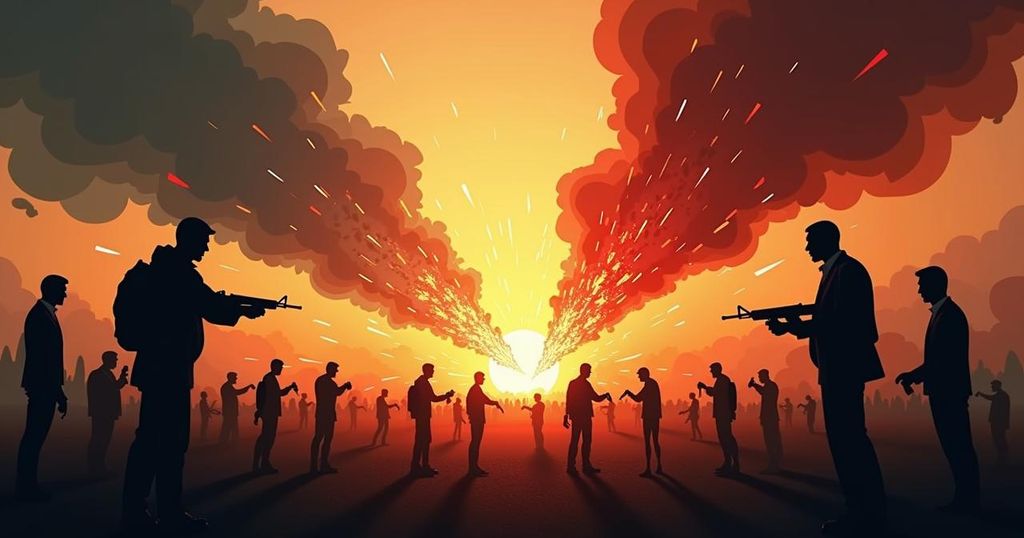Israel and Iran are edging closer to catastrophic war following an unprecedented missile barrage launched by Iran, which targeted significant military installations in Israel. The missile assault signifies a severe escalation in hostilities, with Iran responding to perceived threats and previous actions by Israel. As both sides prepare for potential military responses, the risk of wider conflict in the Middle East looms ominously, urging leaders to seek prudent and informed deliberation to avoid catastrophic outcomes.
The ongoing tensions between Israel and Iran have escalated significantly following a substantial missile attack by Iran’s Revolutionary Guard Corps, which launched roughly 180 missiles targeting key Israeli military locations. This operation was purportedly a response to the assassinations of prominent figures associated with Hezbollah and Hamas. Although many missiles were intercepted, some caused limited damage and minor casualties, advancing the risk of a broader conflict between the two nations. This latest episode marks a precarious step toward direct warfare, with potential repercussions reverberating through the Middle East and beyond. The rapid pace of this attack, in comparison to a similar one earlier in the year, indicates a shift in Iran’s strategy, propelled by concerns over regional perception and stability amidst its allies. Iran’s recent displays of military might are framed as necessary responses to perceived threats, reflecting a growing imperative to confront foreign adversaries, Both Iran and Israel appear committed to escalating hostilities. Iran’s warning of future strikes on Israeli civilian infrastructures suggests a determination to adopt a no-holds-barred approach. The Israeli leadership, influenced by past inadequacies in deterrence, is anticipated to sanction a response that could involve targeting critical Iranian military assets or even contemplating strikes on Iran’s nuclear facilities. However, such military actions are complicated by external factors, including the Biden administration’s opposing stance towards military escalation in Iran and concerns over nuclear proliferation. As Israel responds, decision-makers face the dual challenge of maintaining regional stability while addressing mounting public pressure for a decisive military strategy. The balance of power appears to be shifting, particularly with Hezbollah’s reduced operational capacity, presenting a possible opportunity for Israel to strike. Historical precedents suggest that reckless escalation may lead to a self-reinforcing cycle of conflict, highlighting the necessity for cautious decision-making rooted in past experiences, such as the Cuban Missile Crisis. The historical narratives that emerge from this period will undoubtedly shape the understanding of current and future geopolitical dynamics in the region. Therefore, robust channels of communication between Israel and Iran are essential to prevent misunderstandings that could spiral into wider conflict. Leaders must embody responsibility in their deliberations, drawing from the lessons of history to navigate these complex tensions effectively.
The tension between Israel and Iran has long been a significant issue in the Middle East, characterized by competing agendas and mutual animosities. The recent missile attack by Iran represents a notable escalation in hostilities, as it follows a series of targeted military actions and high-profile assassinations that have intensified fears of direct confrontation. The Iranian leadership perceives increased aggression from Israel as threatening its sphere of influence, particularly regarding its proxy forces like Hezbollah and Hamas. As the Biden administration seeks to manage relations with Iran, the delicate balance of power in the region remains under constant strain, exacerbating the risks of military escalation.
In conclusion, the recent missile attack by Iran represents a significant escalation in the long-standing tensions between Israel and Iran, forcing both parties to reconsider their military strategies and responses. The regional implications of a direct conflict are profound, with potential nuclear undertones that could alter geopolitical dynamics substantially. The lessons from history underscore the critical importance of clear communication and cautious deliberation in the face of rising tensions, as recklessness could lead to disastrous outcomes.
Original Source: thehill.com







